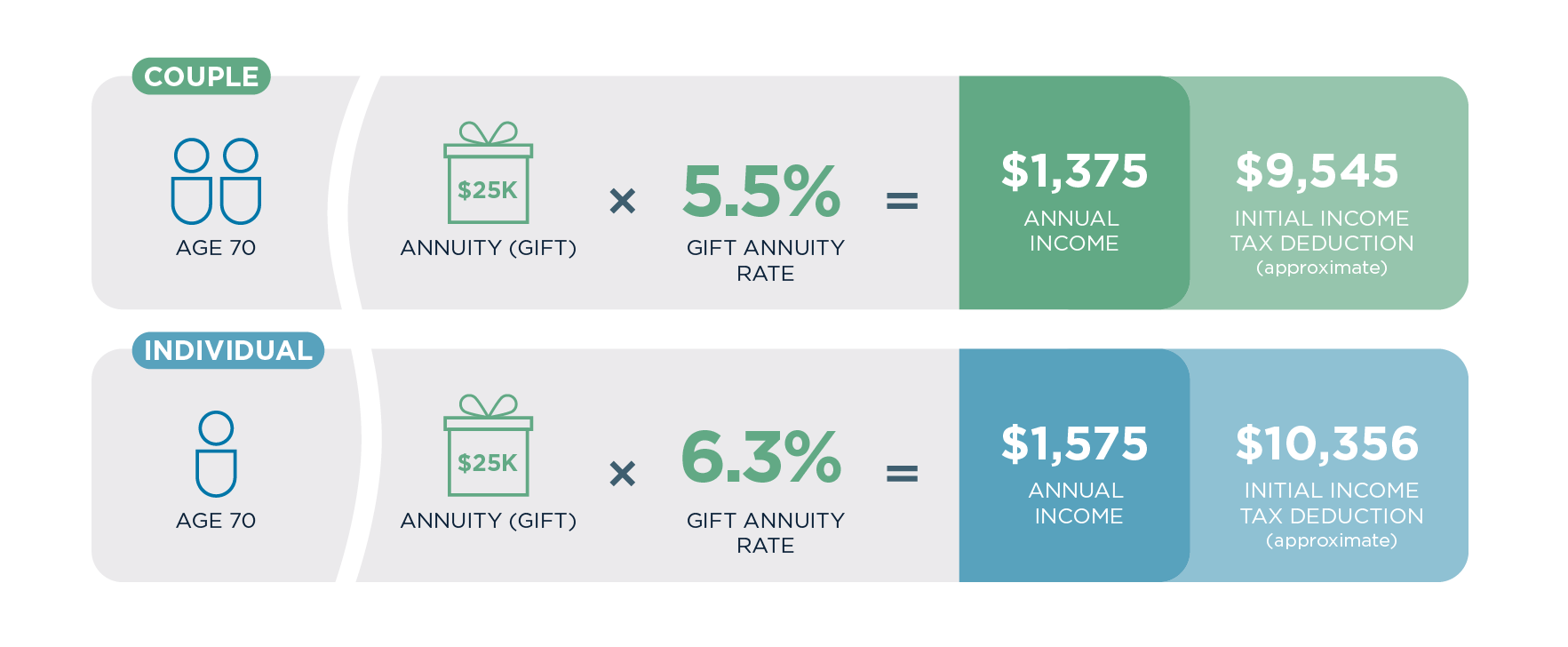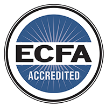Charitable Gift Annuity

Connect With Our Experts
Give the gift of a lifetime. Receive income for life.
The Lord said it is better to give than to receive. With a charitable gift annuity, you can do both. A CGA delivers fixed income for life, immediate tax benefits and a charitable gift to ministry. After your death, the remainder of your gift is passed on to the ministries of your choice. It’s a selfless gift to ministry with all the benefits of an investment.

New in 2023: Fund A CGA With Your IRA
Thanks to the passage of the SECURE Act 2.0, if you own a traditional IRA and are age 70 1/2 or older, you can make a one-time transfer from your retirement account to fund a charitable gift annuity (CGA). These transfers are known as qualified charitable distributions (QCDs), or IRA charitable rollovers. A QCD satisfies your IRA’s required minimum distribution and is excluded from taxable income.
In 2025, individuals are eligible to transfer up to $54,000 from an IRA to a CGA; spouses can combine $54,000 QCDs into a single CGA for a maximum of $108,000. Keep in mind that annual payments from an IRA-funded CGA will be taxed as ordinary income since IRA assets aren’t taxed when transferred to a CGA.
Key Benefits

Receive Income For Life
Fixed rates guarantee the same annual payment for life, even if you outlive the value of your gift.
Protect Your Spouse
For couples, income continues for the surviving spouse after the death of the first.Enjoy Immediate Tax Benefits
You can claim income tax benefits in the first year of your gift.
Get Paid on Your Schedule
You can choose to receive monthly, quarterly or annual payments from your annuity.Start Here
A charitable gift annuity allows you to support charitable causes you care about and receive consistent income. WatersEdge giving professionals are ready to help you create a CGA today!
CONNECT WITH US
Our giving experts are ready to meet with you virtually, by phone or in person.
CREATE YOUR CGA
We’ll gather information and draft documents to help you make your gift. Choose your charitable beneficiary and fund your CGA with stocks, property or cash.
EARN INCOME AND DO GOOD
Receive income for life plus a charitable tax deduction. Feel good knowing your gift will support ministry at your passing.
IMPORTANT!
Be sure to have the following WatersEdge tax information ready when you speak with your financial advisor or IRA administrator:
The Baptist Foundation of Oklahoma dba WatersEdge Advisors | EIN 73-0623038
Giving Example
Mr. and Mrs. Smith are both 70 years old and decide to give a $25,000 charitable gift annuity to their church. They qualify for a 5.5% yield (interest rate) on their annuity, meaning they would receive a $1,375 annual payment from the annuity plus an initial income tax deduction of about $9,545. This $1,375 annual payment will continue for the rest of the Smiths’ lives, even if they outlive the value of their $25,000 gift.

A Charitable Gift Annuity May Be Perfect If:
You want guaranteed income for life.
You want an immediate income tax deduction.
You want protected income for your spouse after your death.
You want to support ministries after your death.
You want to avoid capital gains taxes on contributed stocks or assets.

“I wanted to put the money where it was most needed. I know I can’t do it all, but I hope this gift will support someone with the talent of teaching people about Jesus.”
Lakie Gillespie
CGA Donor | McAlester, Oklahoma

“Generosity is not something we are born with; it is something you have to experience, and once you do, you see there is a need – and God provides… If you wait until you can afford to tithe or give, then it is already too late.”
Gene & Kaye Jones
CGA Donors | Anadarko, Oklahoma

“Every day I say, ‘God let me be a blessing to somebody.’ I get so much pleasure and satisfaction and joy to give whatever I can each year.”
Carmen Henderson
CGA Donor | Owasso, Oklahoma
Go Deeper
A charitable gift annuity is not regulated by the Oklahoma Insurance Department and is not protected by a guaranty association affiliated with the Oklahoma Insurance Department.
Tax Impacts
Upon funding, you receive a charitable tax deduction, and then there’s an annual tax component for the payments that are distributed to you. If you fund with appreciated securities (stocks, mutual funds, etc.), you avoid the immediate capital gains tax associated with the sale, but you are taxed to various degrees on the payments made to you, deferring the capital gains tax.
- Reduce Or Eliminate Estate Taxes – A charitable gift annuity is irrevocable. Therefore, assets used to fund a CGA may be removed from your estate for estate tax purposes.
- Potential Gift Tax Consequences – If you choose to name a beneficiary aside from yourself or your spouse for the CGA income, there is a taxable gift upon funding the CGA, and the value of the gift is reduced to the present value of future income payments from the trust.
- Annuity Payouts Are Taxable – You, or whomever you have selected as a non-charitable beneficiary, must pay tax on the income stream each year.
Fees
The base WatersEdge administration fee is 1.05%. There is an additional fee of .50% for charitable gift annuities, and its proceeds fund an annuity reserve fund that guarantees continued payout even if an annuity is depleted. The total fee is 1.55%.
Minimums
There is a $10,000 funding minimum for charitable gift annuities.
Investment Options
All charitable gift annuities are invested in the Gift Annuity Pool.
Fund Your Gift With A Variety of Assets
- Cash
- Publicly traded stocks and bonds
- Mutual funds
- Real estate
- Many privately held investments
FAQ
1. How does a charitable gift annuity work?
It’s easy: you make a gift to ministry, and in return, WatersEdge agrees to make fixed payments to you and/or your spouse for life. Payments may be made to a maximum of two beneficiaries. At the death of the last beneficiary, the remaining balance of the annuity is used by the ministry you chose for the purpose that the donor specified when the gift was made.
Gift annuities operate under a simple contract between WatersEdge and the donor. They are not trusts but rather income obligations backed by WatersEdge assets.
2. Who should choose a charitable gift annuity?
Most donors who set up CGAs are of retirement age or very near. The older the donor, the higher the annual payout. A deferred CGA works well for donors not quite to retirement age or who don’t have an immediate need for retirement income.
3. How does a deferred gift annuity work?
Donors make a gift to WatersEdge and in return, WE agrees to make fixed lifetime payments to the annuitant(s), commencing at a future date. Deferring the start of payments usually gives donors a higher income rate and a larger charitable deduction than they could secure from annuities whose income starts immediately. This combination of features makes deferred gift annuities an attractive gift option for younger donors who are still in high-earnings years and are looking for both current tax deductions and additional sources of retirement income. (Many donors set the start of payments from their deferred gift annuity to coincide with their anticipated retirement.)
4. When do donors enjoy the tax deduction with a CGA?
Donors get an immediate tax deduction when making the gift.
5. What is the income rate for a CGA?
Annuitant income rates are set by the American Council on Gift Annuities. The rates are based on the age of the annuitant(s) and their life expectancy.
6. How and when do the chosen beneficiaries receive the charitable gift from a CGA?
Charities receive the charitable gift following the death of the annuitant(s). If the annuitant(s) outlives their life expectancy, the principal of the annuity may be impeded.
7. Can the annuity payments end?
No. Since the CGA is a contract between the donor and WatersEdge, an annuitant’s payment will continue even if the donor outlives his or her life expectancy. Payments will not change. In the event that the donor outlives their life expectancy and they want to protect the charity’s gift, they can choose to end their annuity payments.
8. Can CGAs become depleted?
It is possible for a CGA to become depleted, although the annuitant payments will continue. Many donors choose at that point to not receive any further payments, especially if their need for retirement income has changed. If payments continue past the depletion of the CGA principal, the charitable gift is expended and in essence, the charity is paying the annuitant payment. (Note: CGA depletion is very rare.)
Create Your CGA Today
Review Your Giving Options
When you give generously, the details make all the difference. It’s important to keep in mind your family situation, tax considerations and charitable goals.
Make the right choice with a simple side-by-side comparison.








